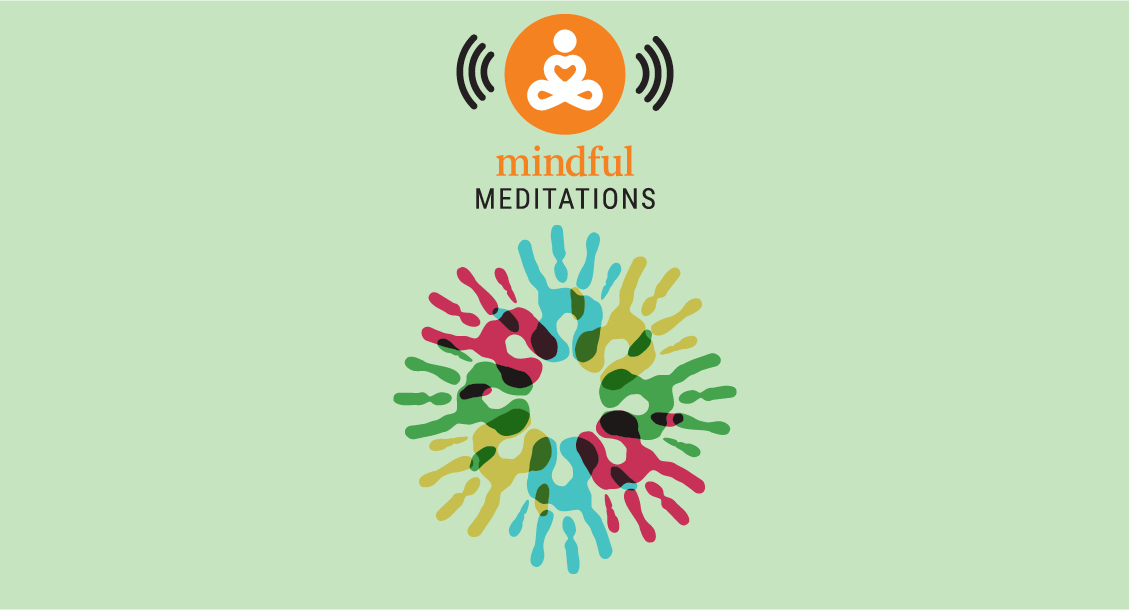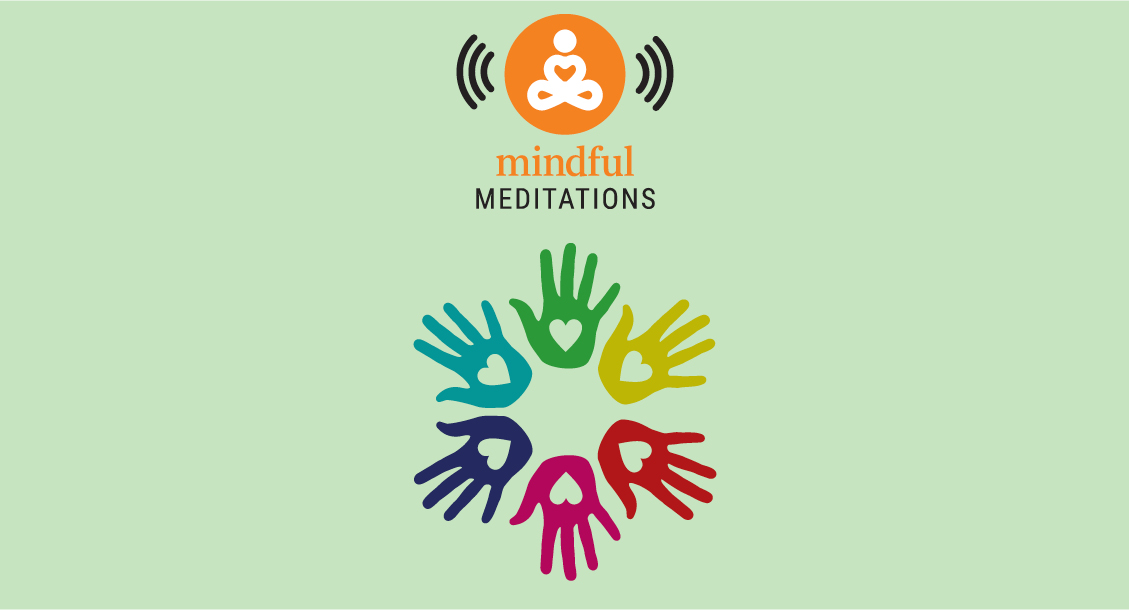For today’s practice we’re going to experiment with creating the space and inner support for working with the wounds we may carry around race and racism.
To me, race and racism are aspects of our social world that can cause suffering and injury. We know this from so much that we’ve seen out in the world, and perhaps we know even more from our own personal experiences. Each of us have very different experiences and degrees of exposure to racial suffering, and so the invitation with this practice is to really open up to what you know in your own body and being, about the racial wounds that you may carry, and what others may carry.
Thinking About Suffering
When we think about how it is that suffering may arise in us, there are many different traditions that invite us to think about, and to have an ethical engagement with the goal and practices for minimizing suffering in the world. For example, under some of the traditional teachings that undergird mindfulness, we’re invited to notice how our suffering can result from clinging too tightly to things that we need to release, pushing away things that might need to be brought closer into our realm of experience for examination, or just sort of remaining in a fog of ignorance or confusion.
In addition to those three basic kinds of psychodynamics of suffering, we might contribute to our own dissatisfaction and unhappiness when we think about race and bias in the world. An extra layer of suffering might come from the way we’ve organized our society to categorize each other and ourselves in terms of race. To rank, order, and create hierarchies, traditionally in the United States, with those who are racialized as white being in a position of privilege and greater access, to a sense of inclusion, value, and worth than others. It’s really painful to look at not just racial identity, but the hierarchies that are associated with these identities and the suffering that can result. That suffering might be called the surplus, or extra suffering above and beyond the kinds of suffering that we might all experience as human beings in a world where we’re all given to kind of crave and cling to things that need to be released, to push away things that’ll make us uncomfortable, or to be somewhat confused.
Watch the video:
Listen to the audio:
Working with Wounds We Carry Around Racism
Read the practice:
A Practice to Reflect on the Wounds of Racism
The invitation of this practice is to look at the particular dimension of suffering that you may have experienced, or others around us may experience, associated with these ideas around race.
- Let’s take a few moments to settle in, finding a posture that embodies the dignity that you carry inherently, the worth that is in your being, and body, and spirit, regardless of whatever else you might be up against. Knowing and sensing that there are no accidents, that you belong fully here now. Breathing in, and breathing out. Feeling your inner worth. Sometimes I think of the pose of a mountain when I settle into this moment of belonging, as a support for engaging in this work. Imagine yourself sitting with the dignity of a mountain as you turn toward supporting yourself, with becoming aware of maybe some aspect of racial wound or suffering that you carry, or that you are aware of in the world.
- Settle in and taking a few deeper than usual breaths. Just allow yourself to feel the sensations of breathing, and sitting, and the liveliness of your body right now. Sensing into what is well within you right now and as you breathe in and out, imagining expanding the sense of what is well. Bringing kind compassion to the holding of your body, and being in this moment.
- From this place, the invitation is to call forth an experience that you’ve had that has taught you something about how racism can cause harms in your own life and experience. This may be a particular experience where you’ve suffered around racism, around being the target of someone’s bias, and here I want you to not necessarily pick the hardest thing for this introductory practice. Recall some moment where you felt slighted or disregarded based on someone else’s perception of your race, or where you’ve witnessed this happening to someone else, if not directly to you. If you’re having trouble recalling some incident of this sort, maybe just noticing the degree to which this may reflect that relative to others, you are protected against some of the more prevalent vulnerabilities that are associated with racism in our time.
- Breathing in and breathing out, see what arises: thoughts, emotions, sensations. Whether you are recalling an incident where you have been a victim of a microaggression or maybe an even more intense experience of bias, or again if not, maybe one that you’ve witnessed. Breathing in, and breathing out. Noticing thoughts, emotions, and sensations that are coming up. Maybe there’s a complex set of emotions and thoughts coming up for you right now. Breathing in, and breathing out. You can hold this. I’ve got one hand over my heart and the other hand over that. If a hand over the heart right now would be an extra support, please allow yourself that. Breathing in, and breathing out, noticing the sensations in the body as you reflect on this moment of pain. This pain around race, racism, and bias. Again, if it is not in your direct experience, notice any thoughts or sensations that might be coming up for you around privilege, or other ways you’re at risk of some self-judgment, criticism, or shame around this. Whatever is coming up for you just allow it.
- If you’re feeling the shame or pain of being targeted, the difficulty or the rage of having so many of these experiences that it’s hard to pick one, whatever is coming up for you, see if you can breathe in and out. Now if you can bring a conscious invitation to sort of support yourself with kindness and compassion, by recognizing that as you recall this incident, you’re recalling a moment of racial suffering. The invitation here is to recognize that indeed moments like this are a part of our lives. I’m going to offer some words to support you in bringing a compassionate holding directly to bear on this experience that you’re recalling.
- Gently allow yourself to settle into the experience of holding these words, and letting them work on you as you explore what might be possible in the way of relating with this suffering, and holding it in ways that allow some healing, some release from the pain. The words are these, “In this moment, I acknowledge that this is what it feels like to suffer around race and racism, or bias because of the way I look, because of the way someone else perceives race in another person. This is racial suffering. This experience unfortunately is a part of our human existence. At this time, we are not alone in feeling the pain of this. I am not alone in feeling the pain of this. Racial suffering is a part of life in societies where race matters. I deserve support in this moment and in all other moments. When this kind of racial suffering, and racism, or bias presents itself, I deserve support, others deserve support. Those who are directly targeted with racism deserve support for their healing, and I deserve support from my efforts to be a resource for the healing that needs to happen around racial wounding at this time.”
- As you breathe in and out again, see if you can name the thoughts, the images, the sensations in the body and where you feel them. Breathing in and out, and seeing what else is here now. Gently allow yourself to open up and feel the ground beneath you, feel the support of the in-breath and the out-breath wherever you happen to find yourself right now. Feel the support of my voice and the sense that you are not alone in your efforts to hold yourself with kindness as you reflect on this one incident, or experience of racial injury, or harm, or wounding. Bringing in kindness, love, and compassion for yourself, and extending this kindness, love, and compassion to all others who are suffering right here. Perhaps suffering more than we are in this moment, or along with you as you have extended compassion in a way that includes ourselves, and extends beyond to others who suffer deeply because of racism in our time. Breathing in, and breathing out. Sensing into the quality of your heart in this moment, seeing if you can receive the wish for well-being that is flowing as we offer this invitation to feel compassionate holding for ourself, and extending it to others. Breathing in and breathing out, feeling the support of the ground, the earth, the breath itself. Sensing now into what is well within you, even as you create more spacious holding of the way you carry racial wounds, or are aware of racial wounds in our time. At the same time, noticing what is well within you.
- As we prepare to shift out of this moment of formal meditation and inquiry, I invite you to make a commitment to journal for a few minutes about what came up for you in this practice. Taking time to write without judgment what you know in your body about how racism causes harm. How it has caused harm to you, your loved ones, friends, your community, people you don’t know, the people you know to have suffered because of racism in our time. Breathing in and breathing out, and seeing if you can sense into that compassionate wish, or alleviation of suffering that can be a deep support for our journey as we do the work of minimizing racism.
Thank you so much for your practice today, may you be well and safe. Be kind to yourself. Appreciate all that you are, and all that brought you to this moment in which you’re taking time to deepen your capacity to stay with these difficult topics. And to deepen your well-being as you journey, and we journey together from here.
Explore session #4
Loving-Kindness to Support Racial Justice Work
This is an opportunity to notice the quality of heart that is associated with the intentions you bring to your practice.
Read More


